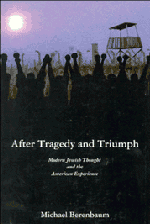Book contents
- Frontmatter
- Contents
- Foreword
- Introduction
- PART I THE HOLOCAUST IN CONTEMPORARY AMERICAN CULTURE
- PART II JEWISH THOUGHT AND MODERN HISTORY
- 8 Franz Rosenzweig and Martin Buber Reconsidered
- 9 The Problem of Pluralism in Contemporary Orthodoxy: Philosophy and Politics
- 10 From Auschwitz to Oslo: The Journey of Elie Wiesel
- 11 Jacob Neusner and the Renewal of an Ever-Dying People
- 12 Political Zionism's Would-Be Successors: Sectarianism, Messianism, Nationalism, and Secularism
- 13 The Situation of the American Jew
- Notes
- Index
10 - From Auschwitz to Oslo: The Journey of Elie Wiesel
Published online by Cambridge University Press: 06 January 2010
- Frontmatter
- Contents
- Foreword
- Introduction
- PART I THE HOLOCAUST IN CONTEMPORARY AMERICAN CULTURE
- PART II JEWISH THOUGHT AND MODERN HISTORY
- 8 Franz Rosenzweig and Martin Buber Reconsidered
- 9 The Problem of Pluralism in Contemporary Orthodoxy: Philosophy and Politics
- 10 From Auschwitz to Oslo: The Journey of Elie Wiesel
- 11 Jacob Neusner and the Renewal of an Ever-Dying People
- 12 Political Zionism's Would-Be Successors: Sectarianism, Messianism, Nationalism, and Secularism
- 13 The Situation of the American Jew
- Notes
- Index
Summary
Elie Wiesel may be the single most influential Jew in America. This chapter examines Wiesel as a Jewish leader and writer. Wiese's work resonates for those who seek to root Jewish identity in a nostalgia for the pasty a mythic embrace of Soviet Jewry's heroic struggle, and the rebirth of Israel.
Wiesel personifies what Jacob Neusner has termed “the American Judaism of Holocaust and Redemption.” Wiese's role and writings reveal the attraction and limits of this Jewish ethos.
The announcement from Oslo – only hours after Yom Kippur had ended – that Elie Wiesel had been awarded the 1986 Nobel prize for peace may have come as a surprise to most Americans, but to American Jews the award seemed natural. The world had recognized what they had long known, that this child of the Holocaust, who had transformed a boy's memories of evil and destruction into eloquent testimony on behalf of the Jewish people – and all oppressed people – was the world-class spokesman for compassion, decency, and human dignity.
Wiesel has attained a unique stature within the American Jewish community. With the passing of Martin Buber and Abraham Joshua Heschel, Wiesel represents Jewish history and values to Jews and non-Jews alike. He is widely revered by all elements of the American Jewish community. He is “an icon of American Jewry's new religion of the Holocaust and Israel,” remarked one nameless detractor with anger and envy as well as respect. Wiesel is also viewed by gentiles as the one non-Israeli embodiment of the Jewish people for this generation – and because he is not an Israeli, Wiesel is untainted by some of the negativity associated with Israel's policies.
- Type
- Chapter
- Information
- After Tragedy and TriumphEssays in Modern Jewish Thought and the American Experience, pp. 117 - 125Publisher: Cambridge University PressPrint publication year: 1990



